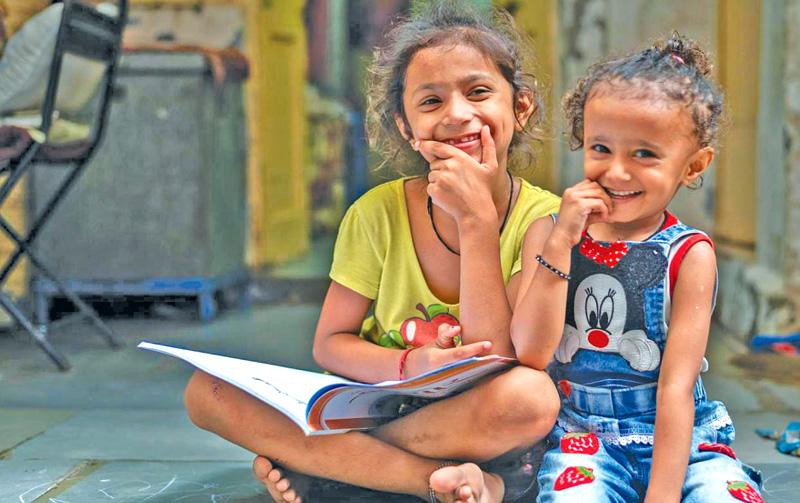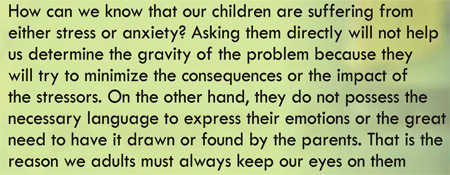
 Are the children suffering from stress more during the Corona period? Are there more stressors prevalent for them in it? We generally tend to think that children are innocent. They are not particularly concerned with what is happening around them and do not take such situations very seriously.
Are the children suffering from stress more during the Corona period? Are there more stressors prevalent for them in it? We generally tend to think that children are innocent. They are not particularly concerned with what is happening around them and do not take such situations very seriously.
They, therefore, are more stress-free than their parents and other older people. But psychologist Dawn Huebner points out that it is not the case for the vast majority of them. Unfortunately, we don’t have mass scale statistics to understand the children’s stress levels in Sri Lanka. However, it is said that more than 1 in 20 children ( not in Sri Lanka) aged between six and 17 suffers from anxiety and stress. Another survey done by the Pew Research Centre revealed that 70 per cent of teens consider that their peers suffer from anxiety or depression. Though it has not been looked into, we can assume that the situation among the Sri Lankan children could be no different.
The biggest problem
The biggest problem is that their lack of experience magnifies the intensity of the problem. It so happens because they have not yet developed the capability to step back and acknowledge that it will pass. It also influences them to think that it is the end of the world when they encounter stressful situations.
That is precisely the way they feel. David Palmiter gives a good explanation for it. According to him, the part of the brain that develops last is the part that helps us cope with decision making. Therefore, those children suffering from anxiety have not got the skills as adults to turn down their fight-or-flight response. Though a certain amount of stress is normal , they are likely to face many problems if it goes unchecked. Huebner warns us that those children with chronic stress will face several physiological and psychological issues.
How can we know that our children are suffering from either stress or anxiety? Asking them directly will not help us determine the gravity of the problem because they will try to minimize the consequences or the impact of the stressors. On the other hand, they do not possess the necessary language to put to their emotions or the great need to have it drawn or found by the parents.
That is the reason we adults must always keep our eyes on them. Palmiter says that if you are constantly running and gunning, your children will know how much you care for them. Palmier advises parents and others to show that they are calm, focused and ready to receive whatever their children tell them. We have found even in our society; children do not want to stress out their parents.
Physical symptoms
Apart from some physical symptoms such as stomachaches and headaches, we can find clues from their behaviour, particularly mood shifts. For example, Huebner says that in children, stress is more likely to take the form of behaviour regression such as trouble eating, sleeping, separating from parents and especially intense irritability and anxiety.
Social changes too have brought stressful life situations. They can include acting withdrawn, trouble with friends, and changes in their academic performance. Huebner says that bad behaviour is a sign that a child has a severe problem beyond their ability to cope.
Language
One primary source of children’s stress is the influence from a parent, in other words, the mom and dad effect. It has been found that there is a greater possibility of the stressful lives of the parents trickling down to their children. What happens is that children very often watch their parents’ relationship. They are keen on how their parents cope with stress, resolve conflicts and interact with others. Therefore, parents have to be very vigilant to manage their relationships in such a way lest it should affect their children badly. Consequently, it is paramount for the parents to set positive examples for their children by modelling and vocalizing strategies.
Particularly the language used by a parent has a significant impact on their children. Thus, instead of using dramatic statements such as ‘Your father will be angry with you. He will not talk to you and you have to employ positive words such as ‘we love you a lot’. It would be better to let your children ask questions so that you can provide answers for them. However, the solutions you are likely to give must be straightforward and non-judgmental.
Lack of relaxation and play has been identified as yet another factor that causes stress among children. We are experiencing that even during the Corona period, many of the school-going children have been burdened with some hectic work that they find challenging to cope with.
Further, social media has become a severe factor in causing stress among children. Through them, children are exposed to unrealistic ideals. Therefore, parents have to monitor children’s use of computers and phones. Fagell recommends limiting the time spent with them to two hours a day. Nevertheless, the pandemic created a situation where children always have to be with their phones, an unhealthy factor that adults have to be conscious of.
Psychologists say children need to have some creative playtime rather than watching television, which is relatively passive. They must have at least one hour outside a day for active play. Parents have to play the crucial role to keep their children happy and content during this time.
Therefore, they need to focus their children’s attention on positive things rather than blaming the pandemic. It is known that stress has been a part of every generation. Therefore, how parents manage their stress and the precautions they take to keep children away from stress are essential factors in today’s society.
